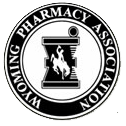WPhA Statement: Change Healthcare Cyberattack
Attention Wyoming Pharmacy Association members: Last week’s cyberattack on Change Healthcare caused disruptions in electronic prescribing and processing insurance claims for pharmacies across Wyoming and the country. As a critical player in the healthcare technology sector, Change Healthcare processes a significant number of healthcare transactions, including patient payments, and is connected to a large portion of U.S. patient records.
We understand the impact of this attack on your patients, especially those covered by Wyoming Medicaid, and your business operations. The Association would like to share some information and potentially helpful tips with our members.
As of February 26th, at noon, Wyoming Medicaid had no substantial updates from Change Healthcare. To help with the claims backlog, the department has enlisted another processor, RelayHealth. Because there is such a backlog of claims, this processor has become bogged down, and it is recommended to continue to try and process claims as you may well get a paid claim. Wyoming Medicaid has been posting updates that can be found here: https://health.wyo.gov/healthcarefin/medicaid/pharmacy-services/
We know that some patients’ care may have been interrupted by this outage, and we wanted to provide resources to our members, as our primary concern is our patients’ health and well-being.
The Wyoming Medicaid Preferred Drug List (PDL) can be found here.
This is an excellent resource for determining if Medicaid covers a patient’s medication. We have heard from some members that they are checking patient history and the PDL to determine if the medication will be covered; if it appears that it will be covered, the pharmacy is billing the claim as cash, charging the patient the appropriate copay (generic $0.65 or brand $3.65) and holding a record of claims that need to be reprocessed once the billing system is up and functioning again. Medicaid claims in Wyoming can be billed up to one year after the initial claim. The Association would always encourage its members to use their clinical judgment in determining the appropriateness of therapy. While this is not ideal for cash flow to the pharmacy, the Department of Health and Medicaid hopes that this issue will be resolved in a timely manner.
The State is also encouraging pharmacies to dispense up to two emergency fills (six total days) to patients who otherwise would be without therapy. This would be up to the pharmacists’ discretion; however, it may be a lifeline to some patients in the greatest need of new therapy medications.
Patient copay cards or manufacturer coupons have largely been affected as well. At this time, it would be best to address these situations individually, explaining the issue transparently and allowing the patient to make a financial decision that is in their best interest.
As always, we aim to showcase that pharmacists and pharmacies are indispensable in providing patient care to our communities. We can help provide a solution to patients in need and fulfill our oath of devoting ourselves to a lifetime of service to others through the profession of pharmacy.
